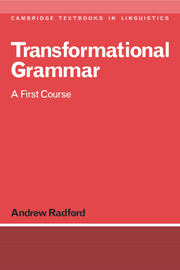1 - Goals
Published online by Cambridge University Press: 05 June 2012
Summary
Overview
The aim of this chapter is to give you some idea of the goals of linguistic theory, and to introduce you to some simple concepts which will be used throughout the rest of the book. Among the notions which will be explained in this chapter are terms such as theory of language, grammar of a language, particular/universal grammar, competence, performance, grammatically, linguistic intuition, rule-governed creativity, generate, observational/descriptive/explanatory adequacy, constraint, markedness, and innateness.
Grammatical competence
Linguistics is the study of Language. But why should we be interested in the phenomenon of Language? Chomsky gives an avowedly mentalist answer to this question. For him, the most fundamental reason for studying language is that language is a mirror of the mind – i.e. by detailed study of language, we might hope to reach a better understanding of how the human mind produces and processes language. As Chomsky remarks (Language and Mind (1972a), p. 103):
There are a number of questions which might lead one to undertake a study of language. Personally, I am primarily intrigued by the possibility of learning something, from the study of language, that will bring to light inherent properties of the human mind.
Information
- Type
- Chapter
- Information
- Transformational GrammarA First Course, pp. 1 - 49Publisher: Cambridge University PressPrint publication year: 1988
